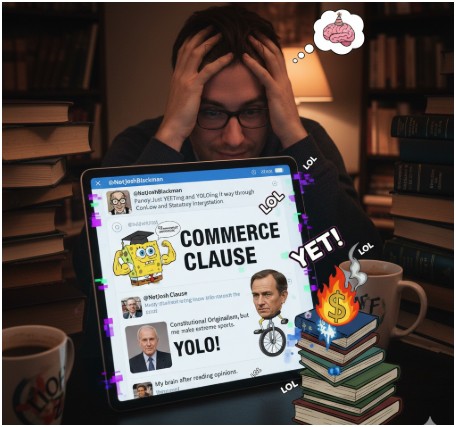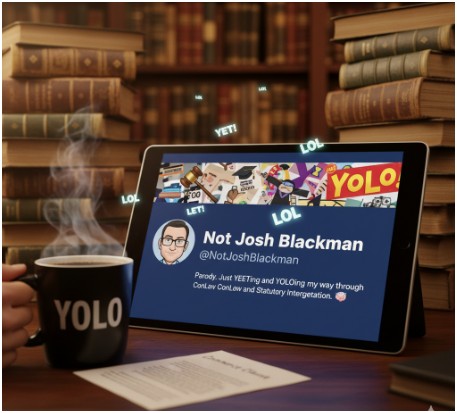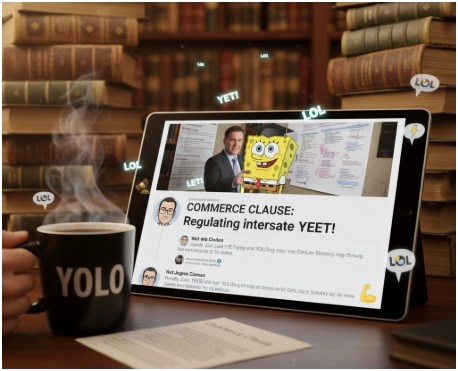Now Reading: The Satirical World of NotJoshBlackman: Why I Secretly Love This Chaos
-
01
The Satirical World of NotJoshBlackman: Why I Secretly Love This Chaos
The Satirical World of NotJoshBlackman: Why I Secretly Love This Chaos

I have a confession: whenever my brain gets fried from reading dense legal opinions, I escape to the chaotic corner of X called NotJoshBlackman.
This parody account is my guilty pleasure. It mocks the legal world with the kind of humor you wouldn’t dare use in a law review footnote.
While serious scholars debate constitutional clauses, this account is busy YEETing and YOLOing its way through the legal universe. And honestly? It’s weirdly refreshing.
What Is NotJoshBlackman All About?

NotJoshBlackman is an anonymous parody account on X (formerly Twitter).
It pokes fun at legal and constitutional topics while pretending to be the opposite of Josh Blackman, a real constitutional law professor at South Texas College of Law Houston.
The name alone tells you it’s not trying to be taken seriously. The account’s bio even comes with a clear disclaimer:
“Parody. Just YEETing and YOLOing my way through ConLaw and Statutory Interpretation.”
This sets the tone. It’s not here to educate or persuade—it’s here to make you laugh at the legal system while sipping your coffee.
How Does NotJoshBlackman Use Humor in Law Talk?

I think what makes NotJoshBlackman stand out is its style. Most legal commentary sounds like it’s been edited by a committee of sleep-deprived owls. This account throws that rulebook out the window.
Posts are full of memes, sarcasm, and wild takes on court cases. They’ll turn complex constitutional principles into punchlines.
Imagine someone quoting the Commerce Clause while adding a SpongeBob GIF—that’s the kind of energy it brings.
It’s satire with a law degree-shaped shadow. If you’ve ever felt like legal Twitter was too serious, this account gives you the comic relief you didn’t know you needed.
Why Is It Called NotJoshBlackman?

The name NotJoshBlackman is more than just a joke—it’s a statement. It directly contrasts with Josh Blackman, who is known for his conservative legal scholarship and frequent writing for major publications.
While the real Josh Blackman builds carefully reasoned arguments about constitutional originalism, the parody account playfully demolishes them in 280 characters or less. The “Not” in its name is the neon sign flashing: This is satire, not scholarship.
Even the real Josh Blackman has had to clarify online that his actual handle is @JoshMBlackman, just to avoid confusion. That says a lot about how convincingly absurd this parody can be.
How Is NotJoshBlackman Different From the Real Josh Blackman?
Let’s break it down in a quick table for clarity:
| Topic | NotJoshBlackman | Josh Blackman |
| Real Identity | Anonymous parody account | Constitutional law professor |
| Tone | Humorous, satirical | Scholarly, serious |
| Purpose | Entertainment | Legal education and commentary |
| Views | Often opposite of his | Conservative-leaning legal analysis |
| Platform Handle | @NotJoshBlackman | @JoshMBlackman |
Seeing this contrast makes me appreciate the parody even more. It’s not trying to replace or mock the person—it’s mocking the ideas in a tongue-in-cheek way. And that’s what makes it work.
Why Does Legal Satire Like This Matter?
Honestly, law can be intimidating. When someone wraps constitutional concepts in memes, it becomes less scary and more approachable. NotJoshBlackman reminds me that it’s okay to laugh at big, complex systems sometimes.
Also, parody forces us to think critically. If a sarcastic tweet makes you rethink a legal argument, it’s doing more than just making you laugh—it’s making you analyze. That’s powerful. Humor can be a sneaky teacher.
Plus, legal culture needs these pressure valves. Without them, everything becomes too stiff and self-serious. This account brings balance—a bit of chaos to balance all that order.
FAQs About NotJoshBlackman
Q1: Is NotJoshBlackman a real person?
Nope. It’s an anonymous parody account. No one knows who runs it, and honestly, that mystery is part of the charm. The anonymity lets them be bolder and sillier without worrying about professional backlash.
Q2: Can I trust legal information from NotJoshBlackman?
Definitely not. It’s not meant to be educational or accurate. Think of it like a legal-themed comedy show. You might pick up a term or two, but don’t cite it in your law school essay unless you want your professor to cry.
Q3: Does Josh Blackman approve of the parody?
He hasn’t endorsed it. But he has clarified that he’s not behind it and that his real handle is @JoshMBlackman. That shows he knows it exists and wants to avoid confusion, which is fair.
Q4: Why do people enjoy following NotJoshBlackman?
Because it’s fun. It makes law less stiff and more human. People like seeing legal culture poked with a stick once in a while—it breaks the monotony of endless serious debates.
Embracing the Chaos, One Meme at a Time
Following NotJoshBlackman has taught me something unexpected: it’s okay to let legal conversations be messy, weird, and even a little ridiculous sometimes. It doesn’t make the law less important. It just makes it more human.
If you ever find yourself drowning in casebooks and constitutional clauses, sneak off to this account. Laugh at a meme about statutory interpretation.
Remember that even the most rigid systems have room for play. And who knows?
You might walk away seeing law in a completely new light—through the lens of chaos, satire, and a perfectly timed YEET.













